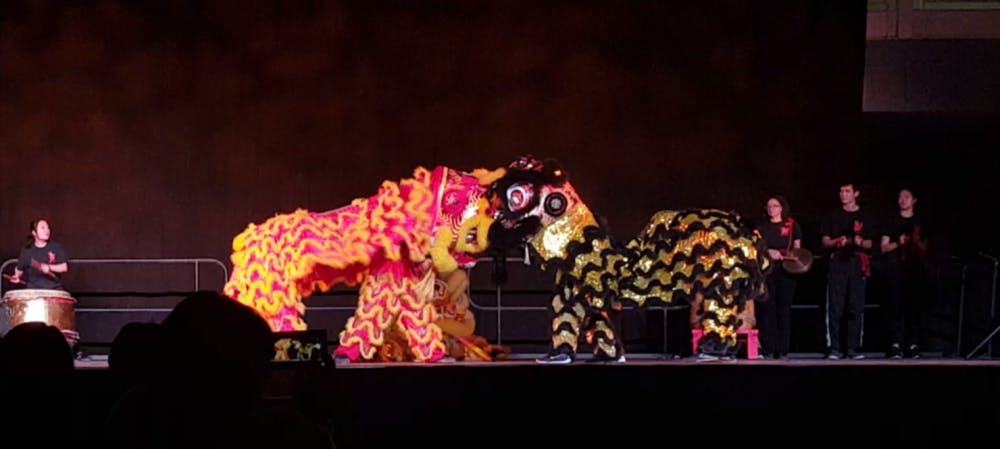On Nov. 11, the Office of Multicultural Affairs held the 30th Annual Culture Show: The Cultural Mosaic at the Ralph S. O’Connor Recreation Center.
There was a wide array of events leading up to the Culture Show, from Salsa Now with Baila!, during which students had the opportunity to learn the basics of salsa, to a master class with Casually Dope to learn the basics of improv, all as part of CultureScape.
The Culture Show was established in 1987 as part of Culturefest, a tradition that was founded to promote understanding and appreciation of cultural differences, which has now evolved into CultureScape.
CultureScape is a series of events, programs and performances that present the many different cultures and backgrounds represented at Hopkins. CultureScape took place from Nov. 6 to 11 this year and culminated in the Culture Show at the end of the week.
The Culture Show is a collaborative showcase of artistic cultural expression that celebrates the many cultures seen at Hopkins. This year 15 different groups (12 dance groups and three a capella groups) and over 250 students performed in front of a packed audience in the Rec Center.
The Temps D’Afrique (TDA) African dance troupe kicked off the show with an animated dance performance, which quickly raised the energy of the audience and was accompanied by a lot of shouting and applause.
Ballroom Dance Club at JHU followed, with a waltz and a tango performance, the former danced by one couple and the latter by two. The ease and elegance of the routines provided a gentle change of pace from TDA whilst retaining their dynamism via the fiery nature of the tango.
Ketzev, the University’s Jewish a cappella group, then performed two songs, one in Hebrew and one in English. The second song they performed was Neon Trees’ “Everybody Talks,” which was a fun, upbeat way to end their set. That said both songs were equally strong, even for those in the audience that couldn’t understand a word of Hebrew, and the skills of the lead vocalists on both really shone.
Next the Hopkins Breakers, the University’s premier freestyle dance crew, performed a series of tricks and moves that had the audience cheering, despite a few timing issues here and there. Then there was Lan Yun Blue Orchids, a dance group celebrating traditional Chinese dance. The group performed an elegant routine and seemed to float around the stage while incorporating plates in a variety of impressive ways throughout the routine.
Baila!, the University’s Latin dance group, performed an energetic routine of four dances — Micaela, Safari, Darte Un Beso and Pegate. The song Pegate, a traditional Puerto Rican Plena, was dedicated to Puerto Rico.
Shakti, the University’s all female Indian classical dance team, then told a cautionary tale on the consequences of continued climate destruction via dance. They depicted the sea levels rising and the unimaginable consequences associated with our actions, with the music and dancing increasing in intensity and drama as the performance went on.
The Filipino Students Association (FSA) then took to the stage, performing a traditional courting dance and a lively routine, which included blindfolds, bamboo sticks and some very impressive jumping. The daring stunts, which involved increasingly high jumps, kept the audience on the edge of their seats throughout the performance.
Music Dynasty, the Hopkins Chinese a cappella group, performed two songs next. Their very talented soloists brought to life a Chinese pop song and a mash-up of Ed Sheeran’s “Photograph” and James Arthur’s “Say You Won’t Let Go.”
The Ladybirds Dance Team then performed a complex and multi-layered routine that embodied the evolution of American culture from the 20th to 21st century, from Great Gatsby-esque flapper dancing to the most important song of the 20th century, “Barbie Girl” by Aqua. The routine came to a close with Avril Lavigne’s 2007 classic, “Girlfriend.”
Kranti, the University’s South Asian a cappella fusion team, blended traditional and modern styles of Indian music with contemporary Western vocal styles in two original arrangements, including one of Jay Sean’s “Down.”
Korean Pop Motion (KPM) performed with the intention of disseminating Korean culture throughout campus. The girls’ group went first and the co-ed group followed. The five girls performed a very cute and fun routine while the second group, donned in ripped black and red clothing, danced to EXO’s “Monster” in an intense K-pop routine that incorporated elements of urban and hip-hop dance.
The two groups had very different styles and energies, but both were perfectly coordinated and exactly in time, choreographed to the T; the performances were slick and polished.
Eruption Step Team was next to perform, with the sounds of the dancers’ steps reverberating through the Rec Center accompanied by the shouts of some of the lead members. Through the warning of their ability to break the stage, the audience watched as the dancers used their entire bodies as instruments to produce complex rhythms and sounds through a mixture of footsteps, spoken word and handclaps.
The Yong Han Lion Dance Troupe performed a traditional-style lion dance celebrating Pocky Day and Chinese Singles’ Day, which both fell on performance day. The group depicted two lions fighting over a lioness that remained in the back of the performance eating pocky and eventually walked off-stage while the two male lions continued to fight over her.
Lastly, Blue Jay Bhangra put on a vivid and lively performance of a dance based on a mix of traditional Punjabi folk music with Western styles, featuring heavy drumbeats, vibrant costumes and complex formations. Despite the noticeable absence of one team member, the group performed a beautiful and energetic dance.
Correction: In an earlier version of this piece, it was incorrectly stated that Baila! performed three dances. They actually performed four dances—Micaela, Safari, Darte Un Beso, and Pegate. Additionally, their dance to the song Pegate, a traditional Puerto Rican Plena, was dedicated to Puerto Rico rather than Darte Un Beso. The News-Letter regrets these errors.

















